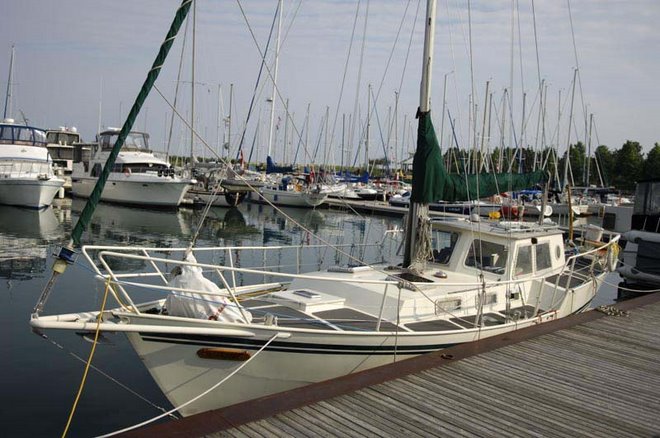 |
| S/V Alchemy: The economy upgrade |
I've just had my 2012 taxes prepared. It's not too bad a hit (as a self-employed contractor, I always pay taxes), but it clearly indicates a mismatch between my earnings versus the time (unpaid and frequently costly in terms of materiel) I spend messing about in boats.
My wife thinks I should sell Valiente, but the market is soft like steam on Mars and I just purchased new rigging, which would add little or nothing to the depressed price I could command for an old and unfashionable (if fast and fun) '70s boat. But it is difficult to argue that Valiente does cost a couple of boat bucks per year, even if the summer dockage is shared, as it currently is. Ideally, meaning if I won a lottery, which is pretty far from ideal, I would like to pickle the boat in a barn or even a trench with a longish hut over it...and sail it until I croak after we return from voyaging. It is admirably suited to its purpose of swanning about the Great Lakes in a rapid and handsome fashion, just as the brutally strong and tank-like Alchemy is suited for homely and capacious, like an aunt fond of cookery named Bertha. Boat pun intended.
 |
| Not risky business at all if you are "cleared" with the bank. |
Suited to purpose is this post's theme, which (again, and perhaps tediously) returns to the idea of cruising, retirement and money, three interlocking concepts that are a source of anxiety and confusion for many folk contemplating drinks and sunburn in some reasonably priced and not at all dangerous tropical locale. Given the way the game is rigged, however, perhaps they should be considering a cache of tinned goods in a sod hut instead of an RRSP or bubbly Vic-bricks in revived, coffee-house-saturated urban cores. Like ours.
Some time ago, I had a dialogue with a ketch owner who had, save for year-long employment stints/cruising kitty recharges in the Japanese educational system, effectively "retired" in her 40s. With a couple of foreign rental properties yielding a modest working income, and with her very modest patterns of consumption, this person had a frugal freedom well planned out. She faced, however, either through jealousy or spite, social criticisms that her plans to do what she felt like, on her own dime, were somehow "selfish", as if "work" was a team sport and stopping work was in some fashion an own goal.
I'm not sure if I'd call that selfish at all. My position is fairly libertarian in this respect: If one likes the deal one is offered as a wage-earner (work until 65, or possibly 70 due to pension drift, and hope the pension plan stays intact until you pop your elderly clogs), by all means one should take it...after a careful and critical evaluation of how that has historically actually worked out, with the keywords of "indexed pension", "underfunded" and "unsustainable" to act as laser flares of guidance.
I recall a fine teacher I had in high school of senior years who basically was in his last year of work, i.e. 64 or 65...and sure as hell looked it. He decided to ditch the standard curriculum and teach us his personal interest in Ontario architectural history, which actually proved useful when I needed to defend the mowing down of the 1855 apartment block I lived in in the 1980s from condo-ization. Thanks to this teacher, I could accurately cite the Georgian features and elements that went into the design of the squat flats in which I then lived, which led to its preservation to this day as a "historical marker". In which, you know, people live. The teacher died of cancer two years after his last classes at the age of 67. I hadn't even finished high school (seed of life lesson thereby planted). I'm sure he would have preferred to jaunt about observing Victorian batten-and-board homes or the variousUpper Canadian mansard-roof interpretations. Yes, I remember this stuff, and am pleased that even if the boomer eat my own pension plans, I went to school at a time when a geezer could teach 16-year-olds about indigenous architecture and make it compelling.
Not everyone has grand personal ambitions or exhibits tumour-like careerism, and if they do, they might channel them into hobbies, yoga or "personal growth".
Whatever.
Do what you will, if it harms none is what I call good advice. If your life and career choices don't involve costing me personally or bothering the horses, have at it. I would hesitate, however, to characterize one's choice as the default setting or right decision for society in general, which, quite frankly, requires a large percentage of fairly unambitious people to just get on with their jobs instead of self-actualizing the lot of us back into the Dark Ages.
 |
| Mutual fund advisors, 565 AD |
When confronted with a liveaboard or a soon-to-be, there can be among those still doing the commute a hint of jealousy and fear: People on the treadmill want company and resent the fact that others, sometimes through sheer happenstance, saw the treadmill early enough to recognize it as a rat-training device and to avoid stepping on it.
Fine. As long as the cruiser/voyager/salt hobo doesn't sponge off the public teat, where such a teat even can be discerned, or finances boat living by pulling scams on four continents, it's no bother to me, and it shouldn't be to anyone else. Cruisers who "retire" in their 40s and 50s may be failing to drink the Kool-Aid, so to speak, and that bothers people who have drunk far too much already.
 |
| B. Behan: Skipper-like boozer and possessor of one of the six types of Irish face. |
I didn't need the small packet of inheritance my parents left me to contemplate sailing off into the sunset while I still have a full head of (mostly) brown hair, but I do feel, quite strongly, that as they didn't have much of a "retirement" together, or ever gotthemselves ro experience the travel they'd hoped to do, it's sort of a post-mortem endorsement that we go cruising in honour of their memories. I'm planning to disperse their ashes into the sea the day we actually push off.
It's a flexible deliverable.
 |
| I Googled "folly of working to a calendar" and found this. It has a boat, at least. |
As is the currrent, if rapidly eroding, paradigm, many people work all their lives, only to pay off houses worth less (of late) than what they paid for them. They enter social (health care, retirement age) and financial (investments in stocks) contracts built on manifest quicksand or at the very least, questionable shorings. Many of them play the game, but the game is arguably and, when the man behind the curtain is revealed, demonstrably rigged.
So one is gradually sussing these facts out. Good for the clever dodge-drone. A realization of how and why the gears grindeth does not obviate the need to work in some fashion until the clogs are inevitably popped. That's why I refer to our upcoming voyaging as a "sabbatical", rather than a retirement. I quite enjoy illusion, but only when it is contrasted with the unblinking light of realistic probability.
Of course, I've worked hard not so much to make money, but to make money sufficient to our needs by doing (mostly) what I like doing, or more to the point, what I don't hate doing. Indifference has been a huge factor in my working life, as I suspect is largely the case across a broad range of wage earners. Largely, I've succeeded in keeping belly full and roof unleaky. Key to this was refusing to fall prey to the cult of stuff (although I do acquire to a questionable degree boat things, some of which may be considered frivolous), and to opt not to drive a car. Main benefit to me is a slow heart rate and nice legs, suitable for a kilt that lately requires taking in.
And $10,000/year left in my pocket, I figure. That's my estimate of the real costs of car ownership.
But what we have done by buying a boat in order to travel the world while renting out our overvalued urban home was no more "risky" than anyone else's choices have, over time, proven to be, and less risky, say, than having a union job in a Canadian factory like a lot of people used to.
Used to.
I run my own pension, such as it is, in part because I can count. It was clear to me as a younger man that a lot of the notions we institutionally held regarding sustainable pensions and the post-war concept of retirement were deeply flawed. UPDATE, 13.08.07: Apparently, it's getting harder to paper over the cracks in the foundational assumptions of many pension schemes. It's intriguing, and blackly comical, to me that we live in a time where people are urged to eat better and take exercise, leading to a longer, more active life, which is wrecking the actuarial basis of pension plans, which are premised on a nice, predictable average date of death.
How dare we live longer? Every year that passes which sees the typical retirement age of 65 persist is another big rusty spike in the heart of pension reform. I am unlikely to see much of it; and my wife, at nearly 13 years younger than me, will probably get a government-issued biscuit on her 90th birthday.
So I haven't, for the most part, and quite consciously, played that rigged game. The risk would have been in having a steady job at the same place for 20 years, frankly, with a decreasing chance of having a crack at a cookie jar raided too soon and too often by my oh-so-legion elders. Being self-employed, by strong contrast, has meant saying goodbye to complacency, and hello to reinventing myself on a regular basis.
Beats sudoku, I figure, and we will wave goodbye to all the middle managers with Audis on the balcony of the club when we leave...and they do not, because they are, in more ways than one, fully vested, committed and helically screwed into the holding ground of their pension plans, adequately funded or no.
Such uncharitable thoughts are not gloating, although it is coming close to it, so much as an acknowledgement that most people would find our choices iconoclastic and unstable, without grasping that their own choices are not necessarily stable at all and that a monster home full of debt-financed stuff can vanish pretty rapidly.
 |
| The Scottish gene in me forbids carrying credit card debt. Och, aye. |
Sounds risky to me, much like insuring cargo ships against piracy.





No comments:
Post a Comment